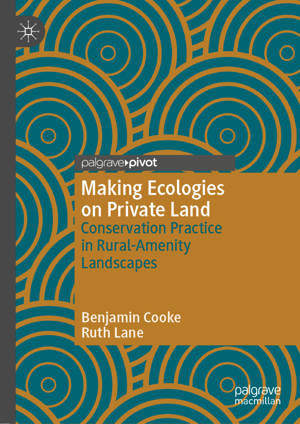
- Retrait gratuit dans votre magasin Club
- 7.000.000 titres dans notre catalogue
- Payer en toute sécurité
- Toujours un magasin près de chez vous
- Retrait gratuit dans votre magasin Club
- 7.000.000 titres dans notre catalogue
- Payer en toute sécurité
- Toujours un magasin près de chez vous
Making Ecologies on Private Land
Conservation Practice in Rural-Amenity Landscapes
Benjamin Cooke, Ruth LaneDescription
This book explores conservation practices on private land, based on research conducted with landholders in the hinterlands of Melbourne, Australia. It examines how conservation is pursued as an intimate interaction between people and ecologies, suggesting that local ecologies are lively participants in this process, rather than simply the object of conservation, and that landholders develop their ideas of environmental stewardship through this interaction. The book also explores the consequences of private property as a form of spatial organisation for conservation practice; the role of formative interactions with ecologies in producing durable experiential knowledge; how the possibilities for contemporary conservation practice are shaped by historical landscape modification; and how landholders engage with conservation covenants and payment schemes as part of their conservation practice. The authors conclude with ideas on how goals and approaches to private land conservation might be reframed amid calls for just social and ecological outcomes in an era of rapid environmental change.
Spécifications
Parties prenantes
- Auteur(s) :
- Editeur:
Contenu
- Nombre de pages :
- 125
- Langue:
- Anglais
Caractéristiques
- EAN:
- 9783030312176
- Date de parution :
- 13-11-19
- Format:
- Livre relié
- Format numérique:
- Genaaid
- Dimensions :
- 148 mm x 210 mm
- Poids :
- 385 g

Les avis
Nous publions uniquement les avis qui respectent les conditions requises. Consultez nos conditions pour les avis.






